Xiuju Fu
DASH: Dialogue-Aware Similarity and Handshake Recognition for Topic Segmentation in Public-Channel Conversations
Dec 17, 2025Abstract:Dialogue Topic Segmentation (DTS) is crucial for understanding task-oriented public-channel communications, such as maritime VHF dialogues, which feature informal speech and implicit transitions. To address the limitations of traditional methods, we propose DASH-DTS, a novel LLM-based framework. Its core contributions are: (1) topic shift detection via dialogue handshake recognition; (2) contextual enhancement through similarity-guided example selection; and (3) the generation of selective positive and negative samples to improve model discrimination and robustness. Additionally, we release VHF-Dial, the first public dataset of real-world maritime VHF communications, to advance research in this domain. DASH-DTS provides interpretable reasoning and confidence scores for each segment. Experimental results demonstrate that our framework achieves several sota segmentation trusted accuracy on both VHF-Dial and standard benchmarks, establishing a strong foundation for stable monitoring and decision support in operational dialogues.
MSD-LLM: Predicting Ship Detention in Port State Control Inspections with Large Language Model
May 26, 2025Abstract:Maritime transportation is the backbone of global trade, making ship inspection essential for ensuring maritime safety and environmental protection. Port State Control (PSC), conducted by national ports, enforces compliance with safety regulations, with ship detention being the most severe consequence, impacting both ship schedules and company reputations. Traditional machine learning methods for ship detention prediction are limited by the capacity of representation learning and thus suffer from low accuracy. Meanwhile, autoencoder-based deep learning approaches face challenges due to the severe data imbalance in learning historical PSC detention records. To address these limitations, we propose Maritime Ship Detention with Large Language Models (MSD-LLM), integrating a dual robust subspace recovery (DSR) layer-based autoencoder with a progressive learning pipeline to handle imbalanced data and extract meaningful PSC representations. Then, a large language model groups and ranks features to identify likely detention cases, enabling dynamic thresholding for flexible detention predictions. Extensive evaluations on 31,707 PSC inspection records from the Asia-Pacific region show that MSD-LLM outperforms state-of-the-art methods more than 12\% on Area Under the Curve (AUC) for Singapore ports. Additionally, it demonstrates robustness to real-world challenges, making it adaptable to diverse maritime risk assessment scenarios.
VTS-LLM: Domain-Adaptive LLM Agent for Enhancing Awareness in Vessel Traffic Services through Natural Language
May 02, 2025



Abstract:Vessel Traffic Services (VTS) are essential for maritime safety and regulatory compliance through real-time traffic management. However, with increasing traffic complexity and the prevalence of heterogeneous, multimodal data, existing VTS systems face limitations in spatiotemporal reasoning and intuitive human interaction. In this work, we propose VTS-LLM Agent, the first domain-adaptive large LLM agent tailored for interactive decision support in VTS operations. We formalize risk-prone vessel identification as a knowledge-augmented Text-to-SQL task, combining structured vessel databases with external maritime knowledge. To support this, we construct a curated benchmark dataset consisting of a custom schema, domain-specific corpus, and a query-SQL test set in multiple linguistic styles. Our framework incorporates NER-based relational reasoning, agent-based domain knowledge injection, semantic algebra intermediate representation, and query rethink mechanisms to enhance domain grounding and context-aware understanding. Experimental results show that VTS-LLM outperforms both general-purpose and SQL-focused baselines under command-style, operational-style, and formal natural language queries, respectively. Moreover, our analysis provides the first empirical evidence that linguistic style variation introduces systematic performance challenges in Text-to-SQL modeling. This work lays the foundation for natural language interfaces in vessel traffic services and opens new opportunities for proactive, LLM-driven maritime real-time traffic management.
Lightweight Multimodal Artificial Intelligence Framework for Maritime Multi-Scene Recognition
Mar 10, 2025Abstract:Maritime Multi-Scene Recognition is crucial for enhancing the capabilities of intelligent marine robotics, particularly in applications such as marine conservation, environmental monitoring, and disaster response. However, this task presents significant challenges due to environmental interference, where marine conditions degrade image quality, and the complexity of maritime scenes, which requires deeper reasoning for accurate recognition. Pure vision models alone are insufficient to address these issues. To overcome these limitations, we propose a novel multimodal Artificial Intelligence (AI) framework that integrates image data, textual descriptions and classification vectors generated by a Multimodal Large Language Model (MLLM), to provide richer semantic understanding and improve recognition accuracy. Our framework employs an efficient multimodal fusion mechanism to further enhance model robustness and adaptability in complex maritime environments. Experimental results show that our model achieves 98$\%$ accuracy, surpassing previous SOTA models by 3.5$\%$. To optimize deployment on resource-constrained platforms, we adopt activation-aware weight quantization (AWQ) as a lightweight technique, reducing the model size to 68.75MB with only a 0.5$\%$ accuracy drop while significantly lowering computational overhead. This work provides a high-performance solution for real-time maritime scene recognition, enabling Autonomous Surface Vehicles (ASVs) to support environmental monitoring and disaster response in resource-limited settings.
Alpha and Prejudice: Improving $α$-sized Worst-case Fairness via Intrinsic Reweighting
Nov 05, 2024Abstract:Worst-case fairness with off-the-shelf demographics achieves group parity by maximizing the model utility of the worst-off group. Nevertheless, demographic information is often unavailable in practical scenarios, which impedes the use of such a direct max-min formulation. Recent advances have reframed this learning problem by introducing the lower bound of minimal partition ratio, denoted as $\alpha$, as side information, referred to as ``$\alpha$-sized worst-case fairness'' in this paper. We first justify the practical significance of this setting by presenting noteworthy evidence from the data privacy perspective, which has been overlooked by existing research. Without imposing specific requirements on loss functions, we propose reweighting the training samples based on their intrinsic importance to fairness. Given the global nature of the worst-case formulation, we further develop a stochastic learning scheme to simplify the training process without compromising model performance. Additionally, we address the issue of outliers and provide a robust variant to handle potential outliers during model training. Our theoretical analysis and experimental observations reveal the connections between the proposed approaches and existing ``fairness-through-reweighting'' studies, with extensive experimental results on fairness benchmarks demonstrating the superiority of our methods.
Prediction of Vessel Arrival Time to Pilotage Area Using Multi-Data Fusion and Deep Learning
Mar 15, 2024Abstract:This paper investigates the prediction of vessels' arrival time to the pilotage area using multi-data fusion and deep learning approaches. Firstly, the vessel arrival contour is extracted based on Multivariate Kernel Density Estimation (MKDE) and clustering. Secondly, multiple data sources, including Automatic Identification System (AIS), pilotage booking information, and meteorological data, are fused before latent feature extraction. Thirdly, a Temporal Convolutional Network (TCN) framework that incorporates a residual mechanism is constructed to learn the hidden arrival patterns of the vessels. Extensive tests on two real-world data sets from Singapore have been conducted and the following promising results have been obtained: 1) fusion of pilotage booking information and meteorological data improves the prediction accuracy, with pilotage booking information having a more significant impact; 2) using discrete embedding for the meteorological data performs better than using continuous embedding; 3) the TCN outperforms the state-of-the-art baseline methods in regression tasks, exhibiting Mean Absolute Error (MAE) ranging from 4.58 min to 4.86 min; and 4) approximately 89.41% to 90.61% of the absolute prediction residuals fall within a time frame of 10 min.
Constructing Trajectory and Predicting Estimated Time of Arrival for Long Distance Travelling Vessels: A Probability Density-based Scanning Approach
May 13, 2022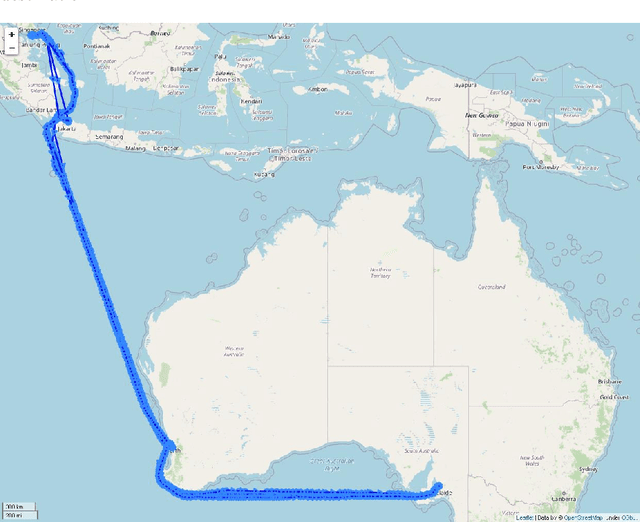
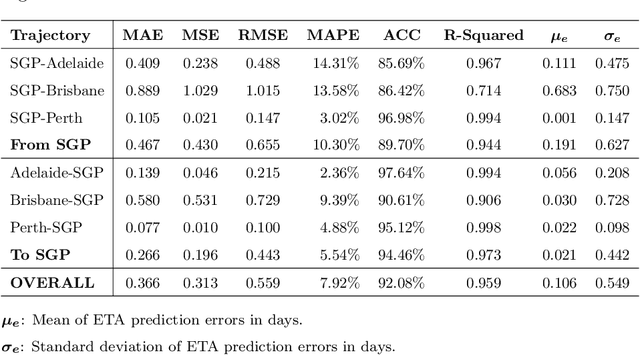
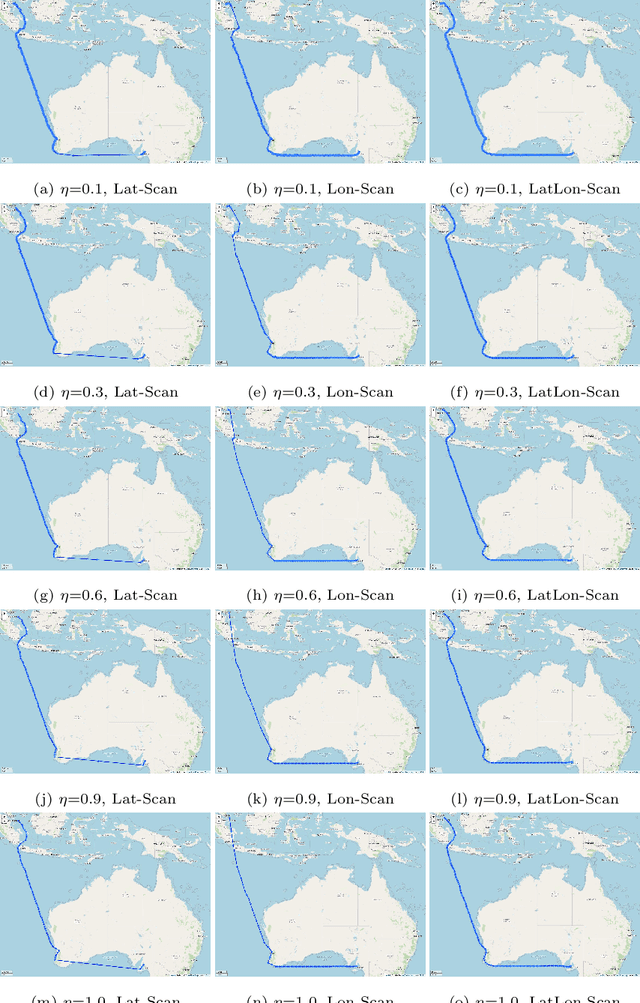
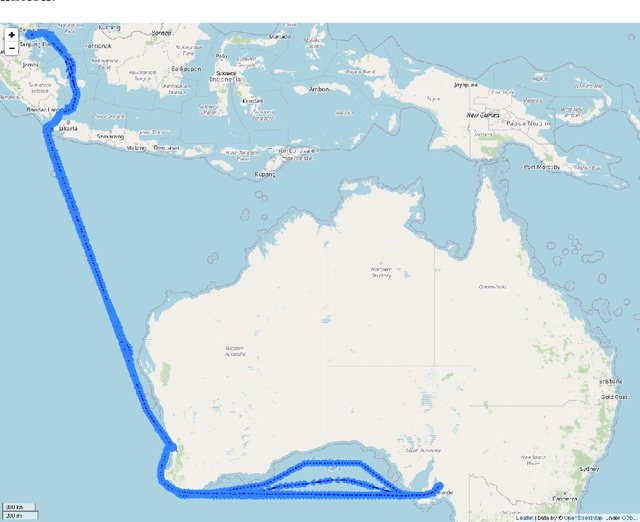
Abstract:In this study, a probability density-based approach for constructing trajectories is proposed and validated through an typical use-case application: Estimated Time of Arrival (ETA) prediction given origin-destination pairs. The ETA prediction is based on physics and mathematical laws given by the extracted information of probability density-based trajectories constructed. The overall ETA prediction errors are about 0.106 days (i.e. 2.544 hours) on average with 0.549 days (i.e. 13.176 hours) standard deviation, and the proposed approach has an accuracy of 92.08% with 0.959 R-Squared value for overall trajectories between Singapore and Australia ports selected.
Predicting Berth Stay for Tanker Terminals: A Systematic and Dynamic Approach
Apr 08, 2022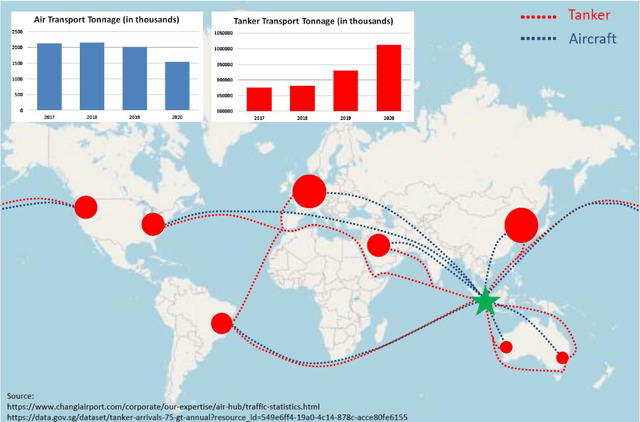
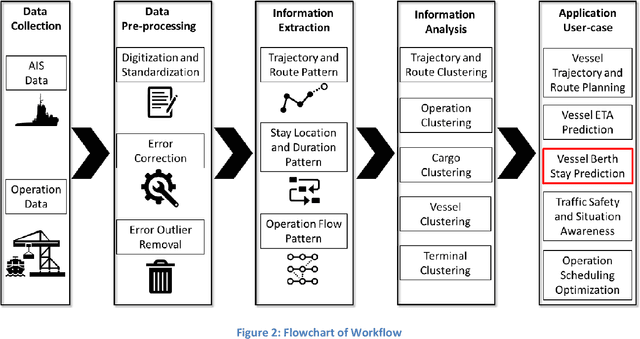
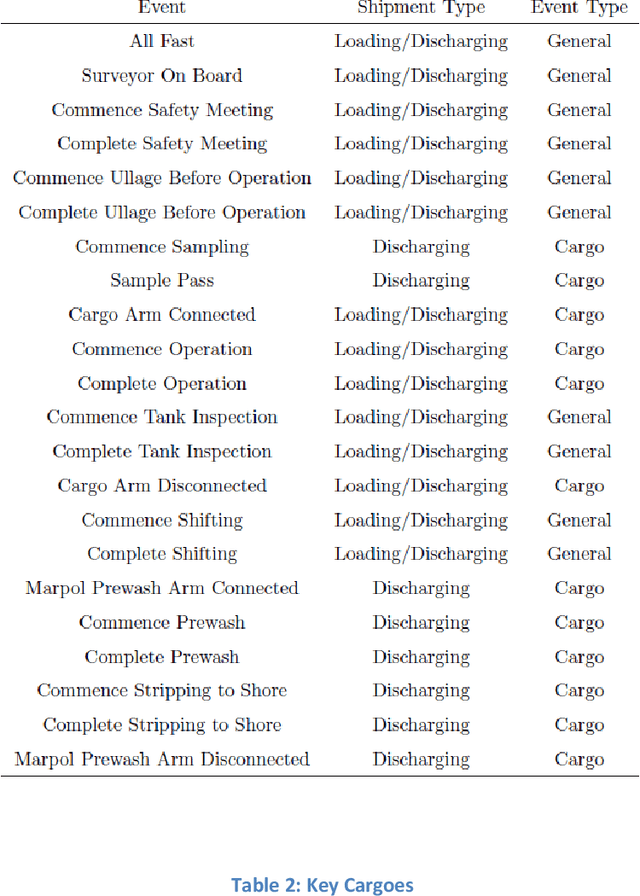
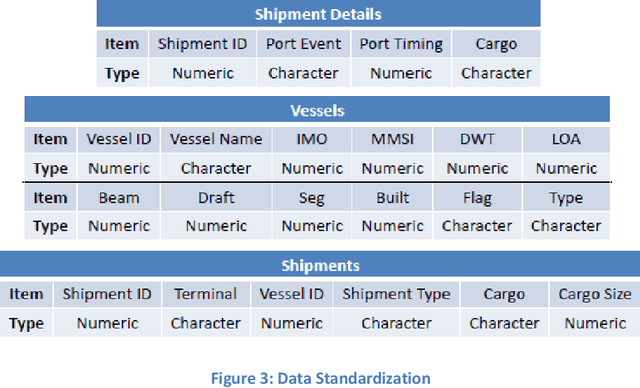
Abstract:Given the trend of digitization and increasing number of maritime transport, prediction of vessel berth stay has been triggered for requirements of operation research and scheduling optimization problem in the era of maritime big data, which takes a significant part in port efficiency and maritime logistics enhancement. This study proposes a systematic and dynamic approach of predicting berth stay for tanker terminals. The approach covers three innovative aspects: 1) Data source employed is multi-faceted, including cargo operation data from tanker terminals, time-series data from automatic identification system (AIS), etc. 2) The process of berth stay is decomposed into multiple blocks according to data analysis and information extraction innovatively, and practical operation scenarios are also developed accordingly. 3) The predictive models of berth stay are developed on the basis of prior data analysis and information extraction under two methods, including regression and decomposed distribution. The models are evaluated under four dynamic scenarios with certain designated cargoes among two different terminals. The evaluation results show that the proposed approach can predict berth stay with the accuracy up to 98.81% validated by historical baselines, and also demonstrate the proposed approach has dynamic capability of predicting berth stay among the scenarios. The model may be potentially applied for short-term pilot-booking or scheduling optimizations within a reasonable time frame for advancement of port intelligence and logistics efficiency.
Optimizing Coordinative Schedules for Tanker Terminals: An Intelligent Large Spatial-Temporal Data-Driven Approach -- Part 2
Apr 08, 2022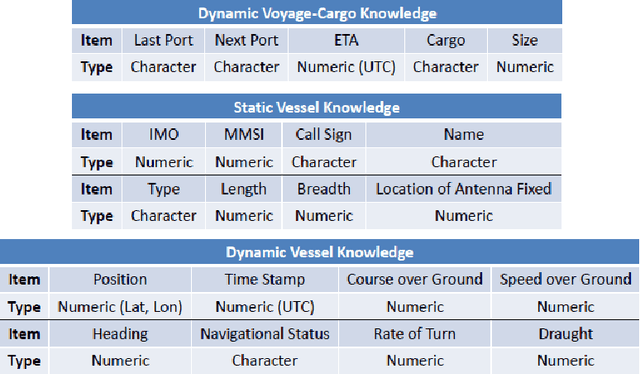

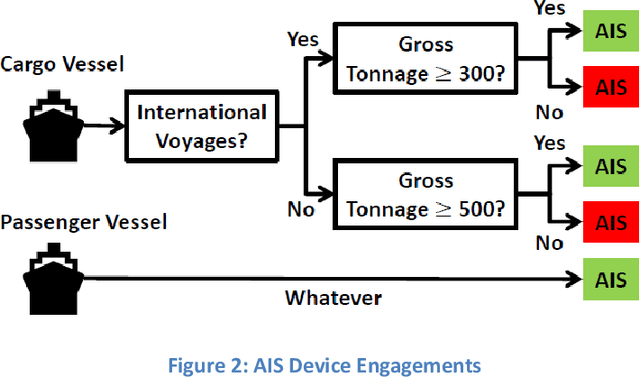
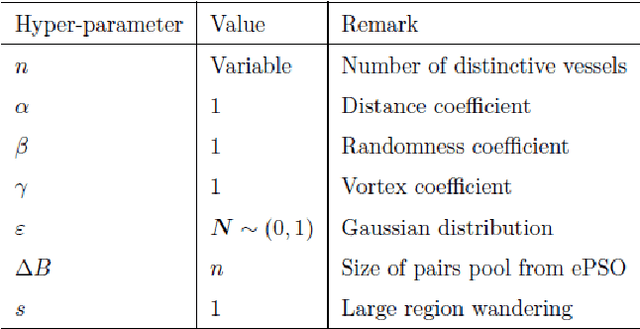
Abstract:In this study, a novel coordinative scheduling optimization approach is proposed to enhance port efficiency by reducing weighted average turnaround time. The proposed approach is developed as a heuristic algorithm applied and investigated through different observation windows with weekly rolling horizon paradigm method. The experimental results show that the proposed approach is effective and promising on mitigating the turnaround time of vessels. The results demonstrate that largest potential savings of turnaround time (weighted average) are around 17 hours (28%) reduction on baseline of 1-week observation, 45 hours (37%) reduction on baseline of 2-week observation and 70 hours (40%) reduction on baseline of 3-week observation. Even though the experimental results are based on historical datasets, the results potentially present significant benefits if real-time applications were applied under a quadratic computational complexity.
Optimizing Coordinative Schedules for Tanker Terminals: An Intelligent Large Spatial-Temporal Data-Driven Approach -- Part 1
Apr 08, 2022



Abstract:In this study, a novel coordinative scheduling optimization approach is proposed to enhance port efficiency by reducing average wait time and turnaround time. The proposed approach consists of enhanced particle swarm optimization (ePSO) as kernel and augmented firefly algorithm (AFA) as global optimal search. Two paradigm methods of the proposed approach are investigated, which are batch method and rolling horizon method. The experimental results show that both paradigm methods of proposed approach can effectively enhance port efficiency. The average wait time could be significantly reduced by 86.0% - 95.5%, and the average turnaround time could eventually save 38.2% - 42.4% with respect to historical benchmarks. Moreover, the paradigm method of rolling horizon could reduce to 20 mins on running time over 3-month datasets, rather than 4 hrs on batch method at corresponding maximum performance.
 Add to Chrome
Add to Chrome Add to Firefox
Add to Firefox Add to Edge
Add to Edge